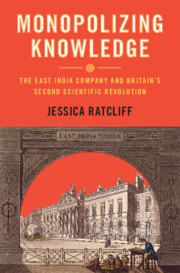
- Publisher:
- Cambridge University Press
- Online publication date:
- January 2025
- Print publication year:
- 2025
- Online ISBN:
- 9781009379526

In the nineteenth century, an ambitious new library and museum for Asian arts, sciences and natural history was established in the City of London, within the corporate headquarters of the East India Company. Funded with taxes from British India and run by the East India Company, this library-museum was located thousands of miles away from the taxpayers who supported it and the land from which it grew. Jessica Ratcliff documents how the growth of science at the Company depended upon its sweeping monopoly privileges and its ability to act as a sovereign state in British India. She explores how 'Company science' became part of the cultural fabric of science in Britain and examines how it fed into Britain's dominance of science production within its empire, as well as Britain's rising preeminence on the scientific world stage. This title is part of the Flip it Open program and may also be available open access. Check our website Cambridge Core for details.
‘By situating East India Company collections in the context of the political economy of British colonialism in Asia, this book presents a compelling new view of the role of knowledge resources – books, artefacts, specimens, models, artworks – in the making of imperial science.'
Felix Driver - Royal Holloway, University of London
‘Through a material-institutional focus on East India Company's knowledge resource accumulation, this book simultaneously puts Company science at the heart of British science in the 18th and 19th century and highlights the India connection of this scientific enterprise.'
Prakash Kumar - Pennsylvania State University
‘This compelling, meticulously researched account is essential reading for anyone who seeks to understand today's informational monopolies and their genesis in the practices of colonial capitalism, informational accumulation and knowledge prospecting enacted by the world's first truly global corporation: the East India Company.'
Bronwyn Parry - King's College London
‘Deeply researched and engagingly written, Ratcliff's captivating account of the East India Company's often controversial efforts to assert a ‘natural monopoly' over scientific knowledge offers a refreshingly new interpretation of the Company's colonial expansion and its enduring legacies, all while provoking readers to reflect on the fundamental tensions between private and public claims to ‘own' knowledge that very much remain with us today.'
Philip Stern - Duke University
 Loading metrics...
Loading metrics...
* Views captured on Cambridge Core between #date#. This data will be updated every 24 hours.
Usage data cannot currently be displayed.